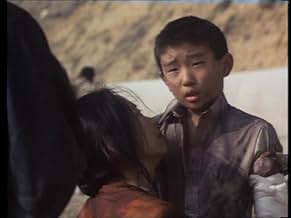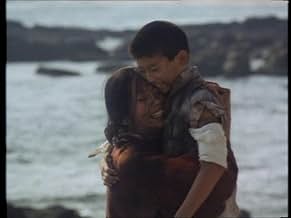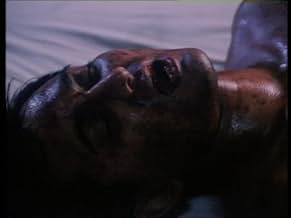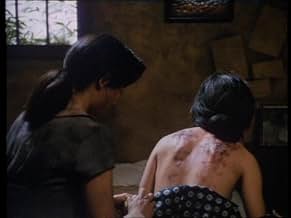Hiroshima - Inferno di cenere
Titolo originale: Hiroshima: Out of the Ashes
VALUTAZIONE IMDb
6,1/10
494
LA TUA VALUTAZIONE
Aggiungi una trama nella tua linguaLife in Hiroshima, following different Japanese, a German priest and church, and some American POWs, before and after the atomic bomb was dropped August 6, 1945.Life in Hiroshima, following different Japanese, a German priest and church, and some American POWs, before and after the atomic bomb was dropped August 6, 1945.Life in Hiroshima, following different Japanese, a German priest and church, and some American POWs, before and after the atomic bomb was dropped August 6, 1945.
- Regia
- Sceneggiatura
- Star
- Candidato a 2 Primetime Emmy
- 6 candidature totali
Recensioni in evidenza
This film gives a very good description of what it might have been to be in a city a see it being completely destroyed. It shows the anguish of searching for your loved ones and the despair of finding them dead. It's a good movie to show what war should not be like, that is, attacking innocent people instead of having an army versus army battle.
This film is commendable for those who are barely literate about some of the Japanese-American tensions and attractions that make the Hiroshima/Nagasaki bombing such a controversial matter more than 60 years later with no end in sight. For such young people the "English-friendly" aspects of this production will be appealing; the special effects and "gross-out" scenes are far enough from original documentary footage and the eyewitness narratives that most sensitive viewers should not have to turn away when victims and injured citizens are in view. The use of "name" actors helps to make some of the August 6 events seem accessible while avoiding the history-by-leaders/ Presidents/ aggressive warriors "trap." A U.S. serviceman's death (character played by Judd Nelson) is somewhat melodramatic but again illustrates some worthy points (the two cultures involved in a "struggle to the death" war while still sharing common values on high technology and fascination with "wins/losses"). I haven't heard if a project like this is slated for the 60th anniversary (2005) of the War-ending bombing but it wouldn't surprise me. My rating 10 *'s for those older than 12 who can sit and discuss this with adults (grandparents who lived at or around that era); and positive value for young and middle-aged adults.
If you watch this film you would have no idea of the huge number of military casualties form the Hiroshima naval base where the bomb inflicted 44,000 military casualties (10,000 Japanese soldiers and sailors dead, 33,000 inured). As a military target, Hiroshima was a major army base that housed the headquarters of the Japanese 5th Division and the 2nd Army Headquarters. It was also an important port in southern Japan and a communications center. Hiroshima naval base was home port to a huge number of Japanese Navy vessels, and where the bombing of pearl harbor exercises and testing took place.
You would also not know from this film that new peer reviewed work in Korea and China show that if the surrender had been delayed another four months, an additional five million persons would have died in Japanese army occupied China, Korea, Philippines, south Asia and Oceania.
And how is it we see the "daily lives" of the Hiroshima civilians without seeing that nearly 50% were directly working in war economy production, including munitions production??
This film concentrates more on the character development of several key figures, rather than on the actual bombing itself. That is the strength of the movie. The moral dilemma of whether to drop a bomb on a city that would kill at least 100,000 people, or but not doing so, initiate a conventional invasion of the Japanese mainland that would have taken several MILLION lives (both American and Japanese seems to logically point to less damaging alternative. However, some naive individuals, including one reviewer, believe losing the millions of lives would not have been an atrocity. All war is an atrocity.
The film is well-directed and the players produce non-hysterical performances in a narrative that covers several key characters simultaneously. One is a doctor with thousands of victims, no hospital supplies and no other doctors around, another is a student at a boys school, one is a Japanese woman who admires American culture, and others include a priest and American POWS. Max Van Syndow gives a moving performance. This movie makes The Day After and others in the genre look like trips to Disneyland.
The film is well-directed and the players produce non-hysterical performances in a narrative that covers several key characters simultaneously. One is a doctor with thousands of victims, no hospital supplies and no other doctors around, another is a student at a boys school, one is a Japanese woman who admires American culture, and others include a priest and American POWS. Max Van Syndow gives a moving performance. This movie makes The Day After and others in the genre look like trips to Disneyland.
I thought this movie was completely missconceived.
First of all, the Japanaes residents of Hiroshima speaking english makes no sense...
Then the American POWs running around town after the explosion... Please, give me a break!
The characters in general where all very shallow, we never get to feel anything for anybody. Some characters are downright ridiculous, like the catholic priest played by Max von Sydow and his (comical) assistants. Scenes featuring the latter are almost farsical.
All in all, this motion picture comes together as a garbled mess, one that is boring and emotionless (for a film on such a topic, hard to believe).
And the ending.... No comment.
Lo sapevi?
- QuizThe film cast includes three Oscar nominees: Max von Sydow, Pat Morita and Mako.
I più visti
Accedi per valutare e creare un elenco di titoli salvati per ottenere consigli personalizzati
Dettagli
- Data di uscita
- Paese di origine
- Lingue
- Celebre anche come
- Hiroshima: Out of the Ashes
- Azienda produttrice
- Vedi altri crediti dell’azienda su IMDbPro
Contribuisci a questa pagina
Suggerisci una modifica o aggiungi i contenuti mancanti

Divario superiore
By what name was Hiroshima - Inferno di cenere (1990) officially released in Canada in English?
Rispondi
































